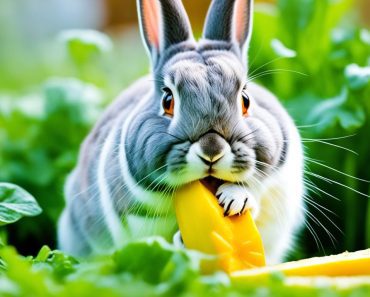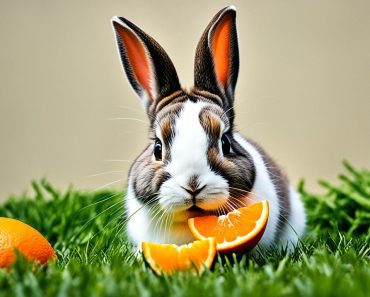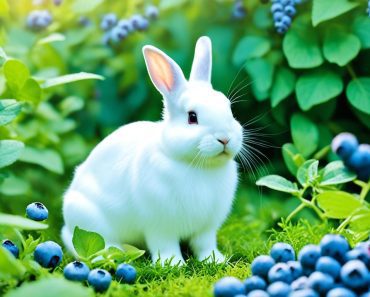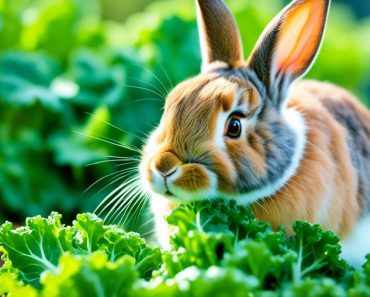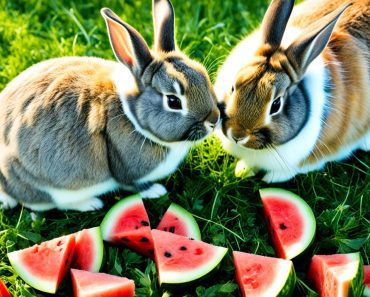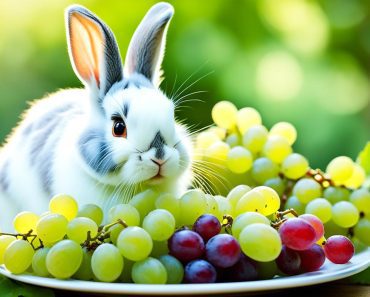As a rabbit owner, I’m always looking for safe and nutritious foods to include in my furry friend’s diet. One question that often comes up is whether rabbits can eat dandelions. So, can rabbits eat dandelions?
The good news is that dandelions are not only safe for rabbits but can also be a healthy addition to their diet. Rabbits are natural herbivores and require a high-fiber, abrasive diet for proper digestion, dental health, and weight regulation. Dandelions, with their abundance of nutrients, can provide a tasty and beneficial option for our bunny buddies.
When it comes to feeding dandelions to rabbits, it’s important to ensure that they are fresh, free from pesticides, and thoroughly washed. Dandelions are known for their rich nutritional profile, including fiber, vitamins B, C, D, and E, calcium, iron, and potassium. These nutrients support proper digestion, respiratory health, and overall well-being in rabbits.
While dandelions are safe for rabbits, it’s essential to remember that they should be given in moderation, just like any other food. A well-balanced rabbit diet should consist of hay, fresh vegetables, and access to fresh grass. Dandelions can complement this diet, providing variety and additional nutrients.
In the next sections, I will delve deeper into the importance of a healthy diet for rabbits, the safe vegetables they can eat, and the benefits of dandelions specifically. I will also share tips for feeding rabbits and provide guidance on transitioning to a healthier pellet diet. Lastly, I will discuss considerations for rabbit treats and snacks.
Can Rabbits Eat Dandelions? Yes, it is safe.
- Dandelions are safe and nutritious for rabbits to eat.
- Rabbits require a high-fiber diet for proper digestion and dental health.
- Dandelions can provide a variety of essential nutrients for rabbits.
- Feeding dandelions to rabbits should be done in moderation as part of a balanced diet.
- Consult with a veterinarian for specific dietary recommendations for your rabbit.
The Importance of a Healthy Diet for Rabbits
Rabbits require a high-fiber, abrasive diet to maintain good digestive health and dental health. A healthy rabbit diet should consist of fresh vegetables, hay, and access to fresh grass.
Hay should ideally make up 80% of a rabbit’s regular diet, providing the necessary fiber and nutrients. It helps with digestion and keeps their teeth in good condition.
Fresh vegetables should be given daily to provide additional nutrients and variety. It’s important to offer a variety of vegetables to ensure a well-rounded diet. Carrots, leafy greens, and bell peppers are popular choices.
Grass is an essential part of a rabbit’s diet and should be provided whenever possible. Rabbits love to graze on fresh grass, and it helps keep their digestive system healthy.
By maintaining a healthy diet, rabbits can regulate their weight and prevent obesity. A high-fiber diet helps keep their digestive system functioning properly, and the abrasive nature of hay and grass helps wear down their continuously growing teeth.
Providing a healthy diet for rabbits is crucial for their overall well-being. Incorporating a variety of fresh vegetables, plenty of hay, and access to fresh grass ensures that their dietary requirements are met, promoting healthy digestion, dental health, and weight regulation.
Safe Vegetables for Rabbits to Eat
Rabbits can enjoy a variety of safe vegetables as part of their diet. Including fresh vegetables in their daily meals provides essential nutrients and adds variety to their rabbit diet. Here are some rabbit-friendly vegetables that you can safely feed your furry friend:
- Artichoke leaves
- Asparagus
- Baby sweetcorns
- Beets
- Broccoli
- Brussels sprouts
- Cabbage
- Carrots and carrot tops
- Cauliflower
- Celeriac
- Celery
- Chicory
- Courgette
- Cucumber
- Curly kale
- Fennel
- Green beans
- Kohl rabi
- Parsnip
- Peas and pea pods
- Peppers
- Pumpkin
- Radish tops
- Rocket
- Romaine lettuce
- Spinach
- Spring greens
- Squash
- Swede
- Turnip
- Watercress
These rabbit-safe vegetables provide essential nutrients and can be introduced gradually and in small quantities to prevent digestive upsets. Adding a mix of these vegetables to your rabbit’s diet will contribute to their overall health and well-being.
The Benefits of Dandelions for Rabbits
I am always looking for ways to enrich my rabbit’s diet and ensure their overall health and well-being. One particular food that has proven to be both safe and nutritious for rabbits is dandelions. These vibrant yellow flowers, which are often considered a nuisance in lawns and gardens, have numerous benefits when included in a rabbit’s diet.
Dandelions are rich in fiber, which is essential for maintaining a healthy digestive system in rabbits. The high fiber content helps prevent gastrointestinal issues and promotes regular bowel movements. Additionally, fiber aids in wearing down rabbits’ continuously growing teeth, preventing dental problems.
Not only are dandelions packed with fiber, but they also provide a wide range of essential nutrients. These include beta-carotene, iron, calcium, potassium, vitamins B, C, D, and E, as well as biotin, inositol, phosphorus, magnesium, and zinc. These nutrients contribute to various aspects of a rabbit’s health, such as strong bones, healthy skin, a robust immune system, and overall vitality.
Feeding dandelions to rabbits offers many benefits beyond their nutritional value. Dandelions have been known to improve digestion, making them an excellent addition to a rabbit’s diet if they experience digestive issues. Moreover, the nutrients present in dandelions contribute to good respiratory health, helping rabbits maintain clear airways and robust lung function.
As a devoted rabbit owner, I can attest to the fact that dandelions are a favorite food for these furry friends. Their vibrant color and unique taste make them an exciting addition to a rabbit’s regular diet. Plus, dandelions are easy to identify as there are no poisonous look-alikes, ensuring their safety when foraged.
Feeding dandelions to rabbits offers a multitude of benefits. From their high fiber content to their rich array of essential nutrients, dandelions contribute to improved digestion, respiratory health, and overall well-being in rabbits. So, the next time you come across a field of dandelions, consider collecting a few for your rabbit’s enjoyment and health!
Tips for Feeding Rabbits
Feeding rabbits a healthy and balanced diet is essential for their overall well-being. Here are some tips to help you provide the right nutrition for your furry friends:
- Ensure Fresh Water: Always make sure your rabbits have access to fresh water. Clean their water bottle or bowl regularly to maintain hygiene.
- Offer a Variety of Vegetables: Include a mix of three or more fresh vegetables in your rabbit’s daily diet. The quantity should be appropriate for their size and dietary needs.
- Limit Sugary Treats: Foods high in sugar, such as fruits, should be served as occasional treats and given in limited quantities to prevent weight gain and other health issues.
- Choose Safe and Organic: When purchasing flowers and vegetables for your rabbits, be cautious of pesticides and chemicals. Opt for safe and organic options to ensure their well-being.
- Monitor Digestive Health: When introducing new foods to your rabbits, closely monitor their digestion. If you notice any signs of digestive upset, discontinue the food immediately.
- Avoid Wilted or Spoiled Vegetables: Do not serve wilted or spoiled vegetables to your rabbits, as they can make them sick. Always provide fresh and high-quality vegetables.
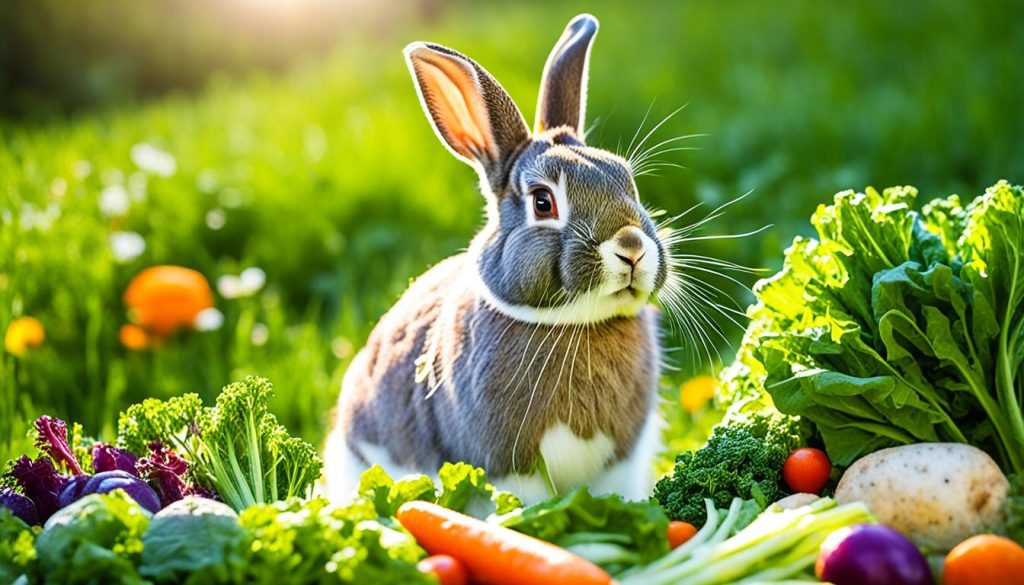
By following these feeding tips, you can ensure that your rabbits receive a nutritious and well-balanced diet. Remember, a healthy diet is crucial for their overall health and happiness.
Transitioning to a Healthy Pellet Diet
When it comes to providing a well-rounded diet for your rabbit, transitioning to a healthy pellet diet can be an essential step. Commercially produced pellets are carefully formulated to meet the specific dietary needs of rabbits, making them a convenient and reliable option.
When choosing pellets for your rabbit, look for options that contain at least 20% fiber. Remember, pellets should only make up a small percentage of your rabbit’s daily diet. Hay and fresh vegetables should remain the main components of their meal plan to ensure they receive sufficient fiber and nutrients.
It’s important to note that alfalfa-based pellets, while suitable for young rabbits and pregnant or nursing rabbits due to their higher calcium content, are not recommended for adult rabbits. Instead, consider transitioning to grass-based pellets, like Timothy pellets, which are more suitable for adult rabbits and provide the necessary nutrition without excessive calcium levels.
When introducing pellets to your rabbit’s diet, consider hiding them among fresh food or scattering them around the garden. This not only encourages your rabbit to eat everything but also provides them with exercise and mental stimulation.
Avoid muesli-style mixes, as they can cause selective feeding and may lead to dental and stomach problems in rabbits. It’s best to stick to a pellet diet that provides balanced nutrition and prevents potential health issues.
To ensure a smooth transition, gradually incorporate pellets into your rabbit’s diet while reducing the amount of their previous food. This gradual change allows their digestive system to adapt and helps maintain their overall health and well-being. Remember to monitor your rabbit’s response to the transition and consult with a veterinarian if you have any concerns.
Considerations for Rabbit Treats and Snacks
While rabbits may have a sweet tooth, it is important to choose treats and snacks carefully. Many human foods can be toxic or unhealthy for rabbits, so it’s crucial to know what is safe for them to consume.
Avoid giving rabbits treats that are high in sugar, fat, or starch, as these can lead to weight gain and other health issues. Instead, opt for healthy and low-calorie options.
Safe treats for rabbits include small amounts of fresh fruits such as papaya. However, be cautious of seeds and pits, as these can be harmful to rabbits. It’s always a good idea to remove them before feeding fruits to your furry friend.
When choosing treats and snacks for your rabbit, it’s essential to check for any potential toxicity or harmful chemicals. Make sure to read the ingredients and avoid any products that may be harmful to your pet.
Treats should only be given in moderation and as part of a balanced diet. Remember that the majority of a rabbit’s diet should consist of hay, fresh vegetables, and access to fresh grass.
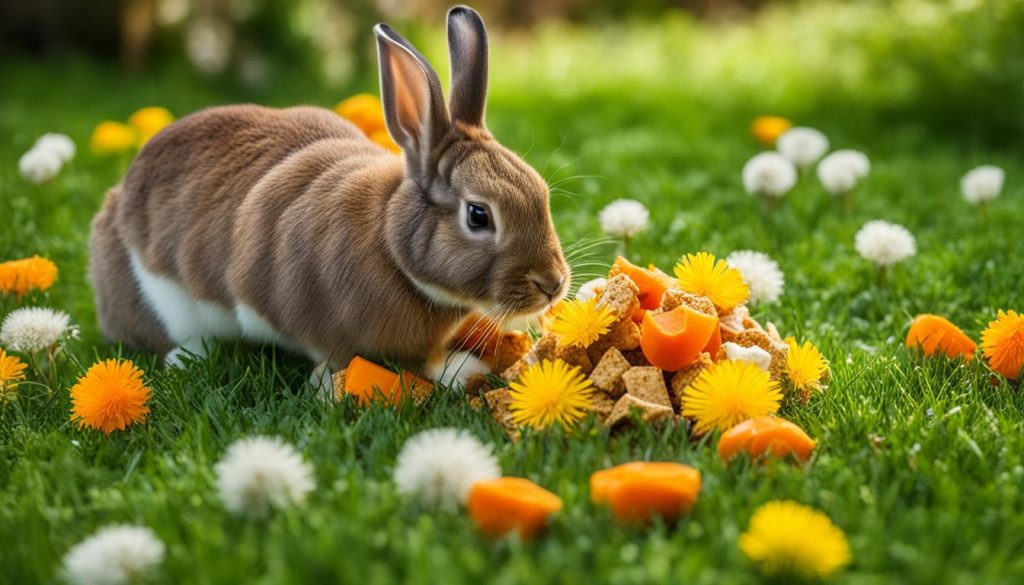
Choose treats and snacks that are safe, healthy, and enjoyable for your rabbit. Providing the right treats will not only satisfy their cravings but also contribute to their overall well-being.
Conclusion
Feeding rabbits safely is essential for their overall health and well-being. By providing them with a high-fiber, abrasive diet, consisting of hay, fresh vegetables, and access to fresh grass, we can ensure rabbits receive the necessary nutrients for proper digestion, dental health, and weight regulation.
Dandelions can be a safe and nutritious addition to a rabbit’s diet. These vibrant yellow flowers are rich in fiber, vitamins, minerals, and antioxidants, making them a beneficial food for rabbits. Including dandelions in a rabbit’s regular diet can promote improved digestion, good respiratory health, and overall body tonic.
However, it is important to be cautious of toxic or unhealthy foods for rabbits. Certain human foods, bulbs, peanuts, raisins, wilted vegetables, and specific fruits can be harmful to rabbits. Therefore, it’s crucial to provide rabbits with a balanced and varied diet, focusing on safe and rabbit-friendly options.
Regular monitoring of a rabbit’s digestion, weight, and overall health is crucial to ensure their well-being. By following recommended guidelines, making informed choices, and providing rabbits with a healthy and satisfying diet, we can ensure they lead happy and healthy lives.

